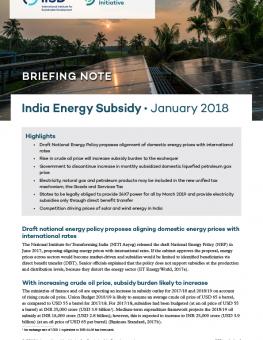
India Energy Subsidy Briefing January 2018
The India Energy Subsidy Briefing covers issues related to energy subsidies. January's edition included the Draft National Energy Policy, crude oil prices, inclusions in the new unified tax mechanism, and the competition driving the prices of solar and wind energy.
As part of its work on energy policy and sustainable development in India, the Global Subsidies Initiative publishes a regular briefing on issues related to energy subsidies.
Below are highlights from the January 2018 edition:
- Draft National Energy Policy proposes alignment of domestic energy prices with international rates
- Rise in crude oil prices will increase the subsidy burden to the exchequer
- The government will discontinue an increase in monthly subsidized domestic liquefied petroleum gas prices
- Electricity, natural gas and petroleum products may be included in the new unified tax mechanism, the Goods and Services Tax
- States will be legally obliged to provide 24x7 power for all by March 2019 and provide electricity subsidies only through direct benefit transfer
- Competition is driving the prices of solar and wind energy in India
For any additional or more detailed information, please do not hesitate to contact Christopher Beaton or Vibhuti Garg.
Participating experts
You might also be interested in
Increased Support Needed to Achieve India's Clean Energy Goals
India is on track to achieve many of its 2030 clean energy goals but needs to step up government support measures to accelerate the deployment of offshore wind, electric vehicles, and green hydrogen, according to a new report.
India Faces Clean Energy Challenges as Energy Demand Soars and Global Fossil Fuel Subsidies Rise
New research finds the global energy crisis and increasing energy demand have pushed India's energy subsidies to a 9-year high.
G20 energy ministers call for cooperation on nuclear energy & low-emission hydrogen
The Group of 20 energy ministers' meeting concluded in Goa on July 22, 2023, with the final summary failing to include language on the phase-down of unabated fossil fuels.
Implementing Solar Irrigation Sustainably
This guidebook provides recommendations to state policy-makers on how they can implement solar irrigation models, particularly decentralized solar plants for irrigation under the PM-KUSUM scheme, effectively and sustainably.